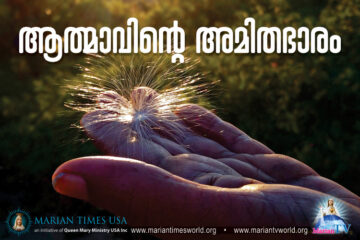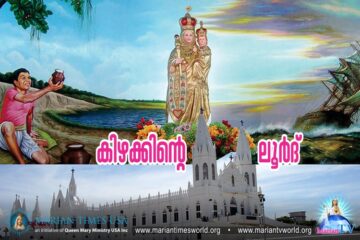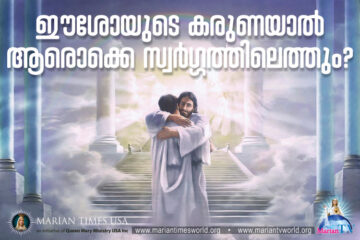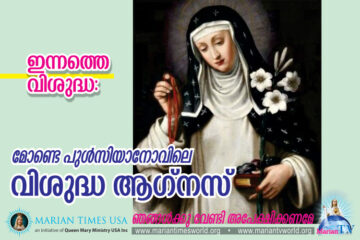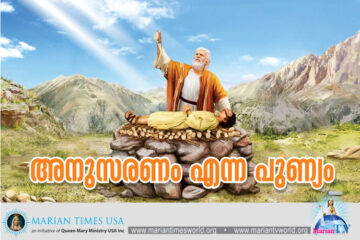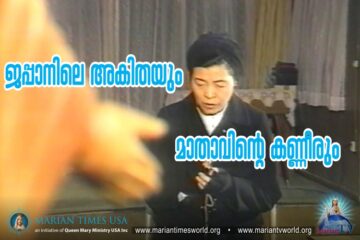HOMILY FEAST OF ST. STEPHEN THE MARTYR
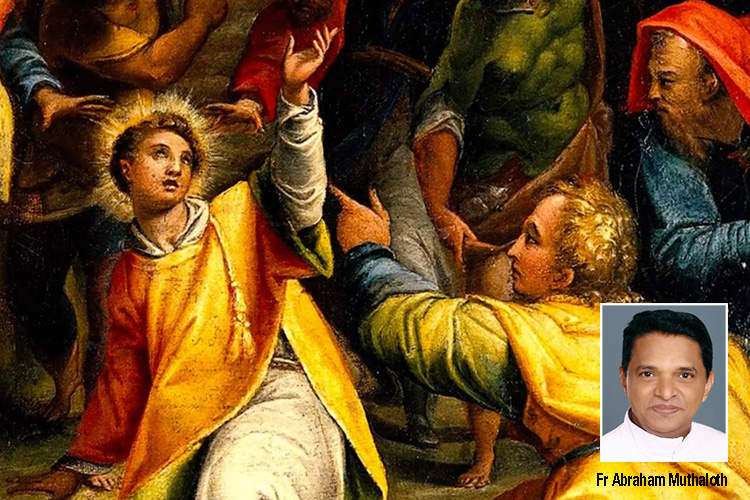
~ Fr. Abraham Mutholath, Chicago, USA. ~
INTRODUCTION
St. Stephen, the first martyr of the church, is a role model for our Christian witnessing. Even if we are not called to shed blood for Christ, our words and actions according to the teachings of Christ can make us living martyrs. Being filled with grace and power of God, the Spirit of the Lord was at work with Stephen during his trial in front of the Sanhedrin. He set us an example of how to face challenges in faith and how to deal with those who persecute us. Following his master Jesus, Stephen forgave the offenses of his persecutors and prayed for them while they were throwing stones at him.Like Jesus, Stephen willingly accepted martyrdom for his faith and preaching.
Bible Text (Acts 6:8-10+7:54-60)
(6:8) Now Stephen, filled with grace and power, was working great wonders and signs among the people. (9) Certain members of the so-called Synagogue of Freedmen, Cyrenians, and Alexandrians, and people from Cilicia and Asia, came forward and debated with Stephen, (10) but they could not withstand the wisdom and the spirit with which he spoke.
Stephen’s Martyrdom.
(7:54) When they heard this, they were infuriated, and they ground their teeth at him. (55) But he, filled with the holy Spirit, looked up intently to heaven and saw the glory of God and Jesus standing at the right hand of God, (56) and he said, “Behold, I see the heavens opened and the Son of Man standing at the right hand of God.” (57) But they cried out in a loud voice, covered their ears, and rushed upon him together. (58) They threw him out of the city, and began to stone him. The witnesses laid down their cloaks at the feet of a young man named Saul. (59) As they were stoning Stephen, he called out, “Lord Jesus, receive my spirit.” (60) Then he fell to his knees and cried out in a loud voice, “Lord, do not hold this sin against them”; and when he said this, he fell asleep.
The Life of St. Stephen
Stephen’s early life is unknown. He was a Hellenistic (Greek speaking) Jew who became Christian and lived in Jerusalem. A tradition from fifth century claims that his original name was Kelil in Aramaic that means “crown.” Stephanos was the Greek word for crown. He was a young and enthusiastic preacher of Christ. He was a leading figure among the seven deacons selected and ordained to serve the early church when there arose a complaint from the Hellenistic Christians that their widows were neglected in the daily distribution of goods. (Acts 6:1). Stephen was the oldest among the deacons and since he was the chief among them, he was titled archdeacon.
(http://www.catholic.org/saints/saint.php?saint_id=137).
Though deacons were selected first to serve at table (Acts 6:2), they were also serving the apostles at the table of the Lord and were preaching the Word of God. Stephen was “filled with grace and power, was working great wonders and signs among the people.” (Acts 6:8). As a Hellenistic Jewish Christian, Stephen could influence Hellenistic Jews for their conversion. This disturbed the leaders of the Hellenistic Jews. So they argued with Stephen to generate evidence against him to present to the Jewish higher authorities. According to Acts 6:9, “certain members of the so-called Synagogue of Freedmen” argued with Stephen along with others. The assumption of scholars is that these freedmen were former Roman slaves who were released and had their own synagogue in Jerusalem, and hence their synagogue was known as the “Synagogue of Freedmen.”
(http://www.bible-history.com/jerusalem/firstcenturyjerusalem_synagogue_of_the_freedmen.html).
The main accusation against Stephen was blasphemy because he spoke against the Temple, where sacrifice was offered to God, and against the Laws of Moses. Sanhedrin questionedhim and sentenced to stone him to death. He was an inspiration for the earlier Christians when they were persecuted. Since Stephen was the first Christian to be martyred,he is also known as “proto-martyr,” that means first martyr.
Selection of Deacons
The first reference we have of St. Stephen is in Acts 6:5 in the context of the selection of “seven reputable men, filled with the Spirit and wisdom” (Acts 6:3) to take care of the daily distribution of resources to those in need in the early Christian community. This selection of seven deacons was the suggestion of the 12 apostles based on the complaint of Greek speaking early Christians against Hebrew or Aramaic speaking Jews.
There were two groups of Jews. The conservative group was known as “Hebrews” because they always remained in Judea, used only Hebrew,their patriarch’s language, and regularly worshiped in the Temple of Jerusalem. The other group consisted of the Jews who were scattered among gentiles, spoke Greek language, were influenced by Greek culture introduced by Alexander the Great, and used the Septuagint that is the Greek translation of the Old Testament. They were known as Hellenists because to Hellenize means to adopt the Greek ideology and culture.
Though both groups were Jews, the Hebrews felt themselves superior and the Hellenists were jealous of the Hebrews and felt themselves as outsiders. Conversion from Christianity happened from both the groups. Still the conflict was carried over that led to the complaint on the distribution of common resources to the widows. However, the dispute was resolved by the establishment of diaconate in the early church.
The apostles wanted to focus more on “prayer and ministry ofthe Word” (Acts 6:4). So, they suggested the community of the Christian disciples to select seven from among the disciples. The community selected the seven on whomthe apostles prayed, laid hands, and appointed for the diaconate ministry. This laying of hands was the customary Jewish practice of invoking the blessing of God and empowering them for their assigned task.
Accusations against Stephen
The secret of Stephen’s success was that he was filled with Holy Spirit. (Acts 6:8). Few people in the Bible were said to be filled with the Holy Spirit. Examples are Samson (Judg. 13:25; 14:6, 19; 15:14), Elizabeth (Luke 1:41), Zechariah (Luke 1:67), Disciples of Jesus (Acts 2:2-4; 4:31), Peter in front of Sanhedrin (Acts 4:8), and Paul (Acts 9:17). When a person is empowered by the Holy Spirit, his faith and actions will be extraordinary. “Stephen, filled with grace and power, was working great wonders and signs among the people.” (Acts 6:9).
The people in the synagogue debated with Stephen and they failed to win him because of his “wisdom and the spirit with which he spoke.” (Acts 6:10). For the Jews, the temple and the law were precious. Stephen preached that the temple had to pass away and the law had to give way to the gospel of Jesus opening up salvation for all people. These were not acceptable to the traditional Jews. So, they made some false witnesses against Stephen. The accusation was that they heard Stephen speaking blasphemous words against Moses and God.
The members of the synagogue brought Stephen to Sanhedrin, the supreme council and tribunal of the Jews headed by a High Priest. Sanhedrin had religious, civil, and criminal jurisdiction. The false witnesses testified that Stephen spoke against the Temple of Jerusalem saying that Jesus would destroy the temple. Another accusation was that Jesus would change the Jewish customs given by Moses thereby making Jesus higher than Moses. (Acts 6:13-14). The members of the Sanhedrin noticed that Stephen’s face looked like the face of an angel.
Format of Stephen’s talk at the Sanhedrin
The high priest gave a chance for Stephen to defend himself. Stephen gave a long discourse of the salvation history where the main leaders of the past like Abraham, Jacob, Joseph, Moses, and David were pleasing to God. But none of them had a temple to worship the Lord until Solomon built the temple. So Godis not to be confined to the temple because God also dwells in human hearts as He did with the patriarchs. Stephen’s point was that “the Most High does not dwell in houses made by human hands.” (Acts 7:48).
The past leaders were willing to make transitions according to the commandments they received from the Lord from time to time. So also, the Jewish leaders of Stephen’s time had to change according to the teaching given through the Son of God, Jesus.
Stephen compared the rejection of Moses by the Israelites in the desert to the rejection of Jesus by the Jewish leaders. (Acts 7:39-42).
So, Stephen attacked the Sanhedrin based on the two pillars of their faith:The Law of Moses and the Temple of the Lord. He also presented how the five prominent leaders of the past kept the laws and could worship God without the temple. With Jesus, the Temple and Law were going to be revised. They did to Jesus what their ancestors did to the genuine prophets of the Lord.Thus, Stephen’s defense turned into bitter accusation against the Sanhedrin.
Stephen boldly called the members of the Sanhedrin, who were gathered to judge him, as murderers and violators of the law. “You stiff-necked people, uncircumcised in heart and ears, you always oppose the Holy Spirit; you are just like your ancestors.” (Acts 7:51). Stephen criticized the Sanhedrin that they were following their ancestors in betraying and murdering the prophets who foretold the coming of the Messiah and not observing the laws. (Acts 7: 52-53).
The reaction of the Sanhedrin was natural. They became furious and gnashed their teeth against Stephen. “Gnashing of teeth” is used in the Bible in two contexts. It is associated with the eternal punishment where there will be wailing and grinding of teeth because it is time of utter disappointment and anger against God and against their own actions in the earthly life. Another context, as used here, is like what Psalm 37:12 says, “The wicked plot against the righteous and gnash their teeth at them.” Similar references are also seen in Psalm 35:16; 112:10; and Lamentations 2:16.In these passages, wicked gnash their teeth at blameless as an expression of their anger or disapproval. In that sense, the members of the Sanhedrin are presented as the wicked and Stephen as the innocent person.
Vision of Stephen
Stephen was privileged to have a vision of the heaven that assured him of his right stand in front of the Sanhedrin. “He, filled with the holy Spirit, looked up intently to heaven and saw the glory of God and Jesus standing at the right hand of God.” (Acts 7:55). Usually, Bible refers to Jesus sitting at the right hand of God. Here we notice a difference that Jesus was standing. The interpretation is that Jesus was active at the trial of Stephen and was extending his hands to receive Stephen to heaven.
However, the Sanhedrin took that vision as the final proof of blasphemy because the Jews did not accept Jesus was the Messiah. So, for them, Jesus could not be beside the Father in Heaven. The members of the Sanhedrin covered their ears, rushed upon Stephen and drove him out of the city to stone him to death. The Jewish law permitted death penalty by stoning for blasphemy. “Anyone who blasphemes the name of the LORD is to be put to death. The entire assembly must stone them.” (Lev. 24:16).
Martyrdom of Stephen
Stephen followed his master Jesus at the time of his martyrdom. While his enemies were stoning him, Stephen called out “Lord Jesus, receive my spirit.” (Acts 7: 59). The vision he had of Jesus standing gave him confidence. Again, Stephen fell to his knees and cried out in a loud voice “Lord, do not hold this sin against them.” (Acts 7: 60). Luke the author of the Acts says that Stephen fell asleep. That shows the faith in the resurrection of the body.
Stephen was the first martyr to be killed by the persecutors of the church. His martyrdom hadinspired many early Christians to face the brutal persecution from the Jews and Romans.
Comparison with virtues of Jesus
Being a first martyr, Stephen also set a good example of how to follow his master Jesus during his trial and martyrdom. Some examples of parallelism of the two are as follows:
Both were trialed in front of Sanhedrin.
Both were accused of blasphemy
Both were accused of standing against the teachings of Moses
Both had false witnesses against them
Both spoke on the destruction of the temple
Both faced trail and death with boldness
Both were martyred outside the city
Both forgave the sins of the persecutors and prayed for them
Both called out, “Lord, receive my spirit.”
St. Stephen and St. Paul
God answered Stephen’s prayer for his enemies by the conversion of Saul who said “when the blood of your witness Stephen was being shed, I myself stood by giving my approval and keeping guard over the cloaks of his murderers.” (Acts 22:20). This Saul who persecuted many Christians later became St. Paul, the Apostle to the Gentiles. And St. Paul also became a martyr for Christ.
Burial and Tomb of Stephen
Christians buried the body of Stephen, but the location of his tomb was unknown for some years. A Christian priest in the year 415 claimed he had a vision of the tomb of St. Stephen and located the remains. A name inside the tomb confirmed that it was of Stephen. It is preserved in the Basilica of St. Lawrence Outside the Walls in Rome.
Statute Symbols
St. Stephen is often depicted with stones, a gospel book, a miniature church and a martyr’s palm. He is the patron saint of deacons, altar servers, masons, casket makers, coffin makers, and horses. His feast day is celebrated on December 26 in the Western Church and on December 27th in the Eastern Church.
Message
1. St. Stephen was enthusiastic for preaching the Word of God andwas bold to face challenges against his mission. Our prayers seeking the intercession of saints like St. Stephen, shall be to gain the same enthusiasm to give witness to the Word of God in our lives.
2. The literal meaning of the word for martyr in Greek is witness. Every Christian who bear witness to Christ in words and actions is martyr in that sense. Blood shed is not essential for becoming a martyr for Christ. However, those who shed their blood were considered great witnesses and were honored from the very beginning of Christianity. As Christians, we are also called to be living martyrs for Jesus and his church.
3. Holy Spirit was at work in the trial of Stephen as Jesus had promised to his disciples. “When they hand you over, do not worry about how you are to speak or what you are to say. You will be given at that moment what you are to say. For it will not be you who speak but the Spirit of your Father speaking through you.” (Mathew 10: 19-20). A true missionary of Christ has nothing to fear and can boldly face unjust trials by the persecutors of the church.
4. The vision of heaven that Stephen had at the time of his trial was an assurance of the great reward for the true disciples of Jesus. The Risen Lord is active to welcome us in heaven.
5. Imitating his master Jesus, Stephen’s last words were prayer for his persecutors: “Lord, do not hold this sin against them.” (Acts 7: 60). Let us keep up this spirit of forgiveness and prayer for our offenders.
6. Again, following Jesus, Stephen died calling out “Lord Jesus, receive my spirit.” (Acts 7: 59). Let us lead a life that would make us recite the same words at the time of our death.
7. St. Luke documented the death of Stephen as, “he fell asleep” (Acts 7:60). For a Christian, death is only a transition from this life to an eternal and blissful life in God’s Kingdom. Our body will be a sleeping or resting until the second coming of Christ.


